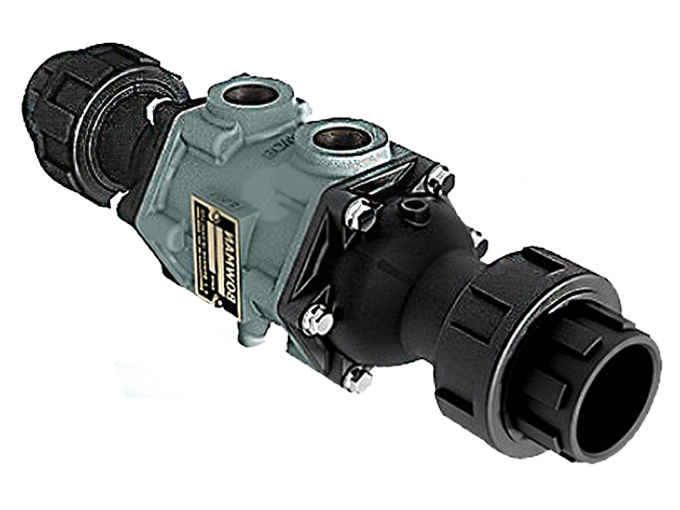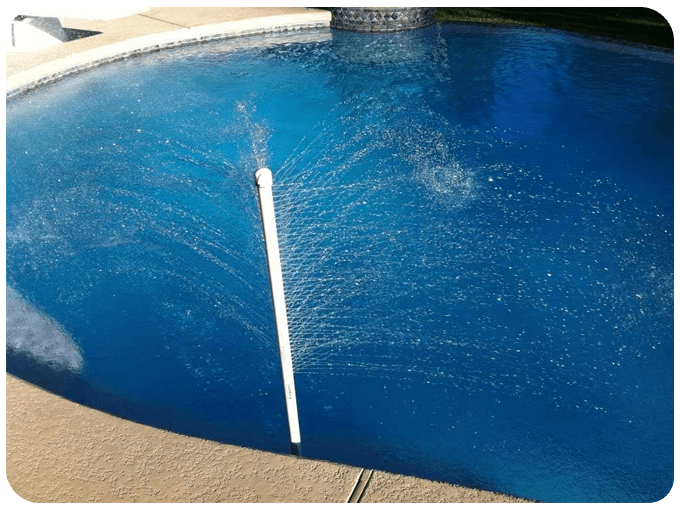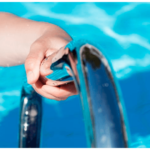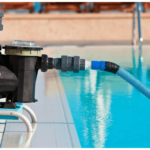Información actualizada April 7, 2024
The pool season is a precious time, but maintaining the ideal water temperature can be a challenge. In this article, we will explore the fascinating technology of water coolers designed especially for fiberglass pools.
Table of Contents
Benefits of Water Coolers for Pools
Enjoying your pool shouldn’t be limited to certain months of the year. With water coolers, you can extend the season and immerse yourself in cool waters whenever you want. These devices not only maintain the ideal temperature but also significantly enhance your swimming experience.
-
Pleasant Temperature:
- The main benefit of water coolers is to maintain a pleasant temperature in the pool. This is especially useful in warm climates where the water temperature can increase significantly.
-
Greater Comfort for Swimmers:
- By keeping the water temperature cooler, swimmers will enjoy a more comfortable and enjoyable experience during swimming and other water activities.
-
Prevention of Overheating:
- In very hot climates, pools can heat up to uncomfortable levels. Coolers help prevent water from overheating, offering a more refreshing environment.
-
More Pleasant Outdoor Environment:
- Cooler water can contribute to creating a more pleasant environment around the pool, making it more attractive for relaxation and outdoor activities.
-
Improved Filtration System Performance:
- Water coolers can also contribute to the performance of water filtration and disinfection systems, as cooler water can be more effective in removing contaminants.
-
Water Evaporation Control:
- By maintaining a cooler temperature, water coolers can help reduce pool water evaporation, meaning less need for water replenishment.
-
Efficient Resource Use:
- By maintaining a cooler temperature, the need for heating systems in pools during warm months can be reduced, contributing to more efficient use of energy resources.
-
Adaptability to Different Climates:
- Water coolers are especially useful in climates where temperatures are high for much of the year. They allow pool owners to adjust the water temperature according to weather conditions.
-
Enhanced Experience for Events and Gatherings:
- If you plan to hold events or gatherings around the pool, maintaining a cooler water temperature can significantly enhance guests’ experience.
-
Less Stress on Equipment and Materials:
- By avoiding extremely high water temperatures, stress on pool equipment, such as pumps and filtration systems, as well as pool materials, is reduced.
Types of Coolers for Fiberglass Pools
- Air Coolers:
- Operate by circulating air to cool the water.
- Ideal for warm and dry climates.
- Heat Exchangers:
- Use heat transfer to regulate water temperature.
- Efficient and suitable for pools of different sizes.
- Evaporative Cooling Systems:
- Employ the evaporation process to naturally cool the water.
- Eco-friendly and cost-effective in the long term.

Factors to Consider When Choosing a Water Cooler
When selecting the right cooler for your fiberglass pool, consider key factors such as pool size, energy efficiency, and ease of installation. This will ensure optimal performance and a hassle-free experience.
-
Pool Size:
- Consider the size of your pool, as water coolers are designed for pools of different dimensions. It is essential to choose a cooler that can efficiently handle the water volume of your pool.
-
Cooling Capacity:
- Check the cooling capacity of the device. Capacity is measured in terms of the amount of water it can cool in a specific period. Make sure the capacity is suitable for your pool and local climate.
-
Energy Efficiency:
- Opt for a water cooler that is energy-efficient. Look for models that feature energy-efficient technologies to reduce electricity consumption and operating costs.
-
Type of Cooler:
- There are different types of water coolers, such as absorption coolers, evaporative coolers, and heat exchange systems. Understand the differences between these types and choose the one that best suits your needs and preferences.
-
Compatibility with Existing Systems:
- Verify if the cooler is compatible with your pool’s filtration and disinfection systems. Proper integration ensures smooth operation and optimal efficiency.
-
Installation and Maintenance:
- Consider the ease of installation and maintenance of the cooler. Look for models that are easy to install and require minimal maintenance to ensure trouble-free use.
-
Temperature Control:
- Some coolers allow for precise control of water temperature. Evaluate whether the model you are considering offers the ability to adjust the temperature according to your specific preferences and needs.
-
Durability and Corrosion Resistance:
- Since coolers will be in contact with water, ensure they are constructed of durable materials resistant to corrosion. This ensures a longer lifespan and consistent performance.
-
Noise Level:
- Consider the noise level produced by the cooler. Look for models that are quiet to avoid interfering with the peaceful experience around the pool.
-
Initial Cost and Operating Costs:
- Evaluate both the initial cost of the cooler and operating costs over time. Balance the initial investment with long-term efficiency and energy savings.
-
Manufacturer Support and Warranty:
- Research the cooler manufacturer and the warranty they offer. A solid backing and adequate warranty provide peace of mind and support in case of issues.
-
Recommendations and Reviews:
- Research reviews and feedback from other users who have used the same cooler model. Others’ experiences can offer valuable insights into the actual performance of the product.
Cooler Installation and Setup
Installing a water cooler doesn’t have to be complicated. Follow these simple steps to quickly enjoy the benefits of always refreshing water. Additionally, we provide some useful tips for efficient and hassle-free setup.
General Steps for Installation and Setup:
- Preparation:
- Carefully read the installation manual provided by the manufacturer.
- Verify that all necessary components and accessories are included.
- Ensure you have the necessary tools and equipment.
- Cooler Location:
- Select a suitable location for installing the cooler. It should be a well-ventilated area and accessible for pipe connections.
- Connection to the Pool:
- Connect the cooler pipes to the pool according to the manufacturer’s instructions. Ensure that the connections are secure and properly sealed.
- Electrical Connection:
- Connect the cooler to the power source following the manufacturer’s instructions. Verify that the electrical installation complies with safety regulations.
- Integration with Existing Systems:
- If the cooler needs to integrate with the pool’s filtration and disinfection system, follow the manufacturer’s instructions to ensure proper connection.
- Temperature Adjustment:
- Set up the cooler to reach the desired water temperature. Some models allow for precise adjustments through specific controls.
- Initial Testing:
- Perform initial tests to ensure the cooler is functioning correctly. Check the water temperature and cooling efficiency.
- Pipe Insulation (if necessary):
- If the cooler pipes are exposed to extreme weather conditions, consider insulating them to prevent heat loss or excessive cooling.
- Continuous Monitoring:
- Continuously monitor the cooler’s operation during the first few days to ensure everything is in order. Adjust the settings if necessary.
- Regular Maintenance:
- Follow the manufacturer’s recommendations for regular cooler maintenance. This may include filter cleaning, connection inspection, and other specific tasks.
Tips for Regular Maintenance Water Coolers for Pools
Proper maintenance ensures continuous and lasting performance. From cleaning the system to checking components, discover how to keep your cooler in optimal condition. Additionally, we present simple solutions for common problems.
Regular maintenance of fiberglass pool coolers is essential to ensure optimal performance and extended lifespan. A best practice is regular cleaning of filters, removing dirt buildup to maintain cooler efficiency. Additionally, periodic visual inspection of connections and pipes should be conducted to identify and repair potential leaks or damages, ensuring smooth operation.
Another key aspect is constant monitoring of water levels, avoiding issues arising from inadequate levels. Maintaining recommended levels and preventing cooler operation without water are important steps to avoid damage. The importance of regular cleaning of the cooler’s exterior surface to prevent dust and dirt buildup, which can affect efficiency and appearance, is also highlighted.
Fan efficiency and proper operation of the control unit are essential elements. It is recommended to clean the fan blades and check the status of the control unit, calibrating it according to the manufacturer’s instructions. Additionally, preventing blockages in air intakes and maintaining water chemical balance are essential practices. Establishing a preventive maintenance program based on the manufacturer’s recommendations ensures effective and timely management of cleaning, inspection, and adjustment tasks, contributing to prolonged efficiency and lifespan of the cooler.
Current Trends in Cooling Technology
Innovation never stops. Discover the latest trends in cooling technology, from cutting-edge designs to advanced features that adapt to changing consumer needs.
Current trends in cooling technology for fiberglass pools focus on advancing towards more efficient and sustainable solutions. Lately, there has been an increase in demand for environmentally friendly and energy-efficient coolers, with a focus on integrating smart systems for remote control and automation. The use of solar energy, aesthetic and compact designs, as well as the exploration of innovative materials, are highlights in the evolution of these systems. Additionally, attention is focused on providing customization and an enhanced user experience, including compatibility with renewable energies and improvement of filtration systems to maintain water quality. In summary, current trends aim to optimize efficiency, sustainability, and comfort in fiberglass pool cooling systems.

Understanding Fiberglass Technology in Pools
To fully understand the benefits of water coolers, it is crucial to understand why fiberglass pools are a popular choice. We explore the advantages that this material offers in terms of durability and resistance.
-
Corrosion Resistance:
- Fiberglass is inherently resistant to corrosion, meaning it will not be affected by continuous exposure to water and chemicals used in pool maintenance.
-
Long-Term Durability:
- Fiberglass pools are known for their long-term durability. This material can withstand the stresses and strains associated with regular use and temperature fluctuations.
-
Lightweight yet Strong:
- Although lightweight compared to some traditional materials, fiberglass is surprisingly strong. This facilitates handling during installation and provides structural strength.
-
Design Flexibility:
- Fiberglass allows for significant flexibility in pool design. It can adapt to diverse shapes and sizes, making it easy to customize to meet aesthetic and functional preferences.
-
Smooth and Non-Porous Surface:
- The surface of fiberglass pools is smooth and non-porous. This not only facilitates cleaning and maintenance but also prevents the proliferation of algae and fungi.
-
Low Maintenance:
- Fiberglass pools require less maintenance compared to some alternatives. The smooth surface reduces dirt buildup and facilitates regular cleaning.
-
Chemical Resistance:
- Fiberglass is resistant to most chemicals used in pool water treatment, contributing to the durability and longevity of the material.
-
Thermal Insulation:
- Fiberglass provides good thermal insulation, helping to maintain pool water temperature more efficiently and reducing heat loss.
-
Less Prone to Cracks:
- Unlike some materials like concrete, fiberglass is less prone to cracks and fissures, contributing to a stronger and more resilient structure.
-
Quick Installation:
- The installation of fiberglass pools tends to be quicker compared to other types of pools, which can reduce labor costs and downtime.
-
Suitable for Unstable Grounds:
- The flexibility and strength of fiberglass make it suitable for grounds that may experience settlements or movements, as it is less prone to cracking or damage compared to some more rigid materials.
Conclusions
In summary, water coolers for fiberglass pools are the key to fully enjoying your personal oasis. From maintaining the ideal temperature to contributing to sustainability, these devices significantly enhance your swimming experience.


